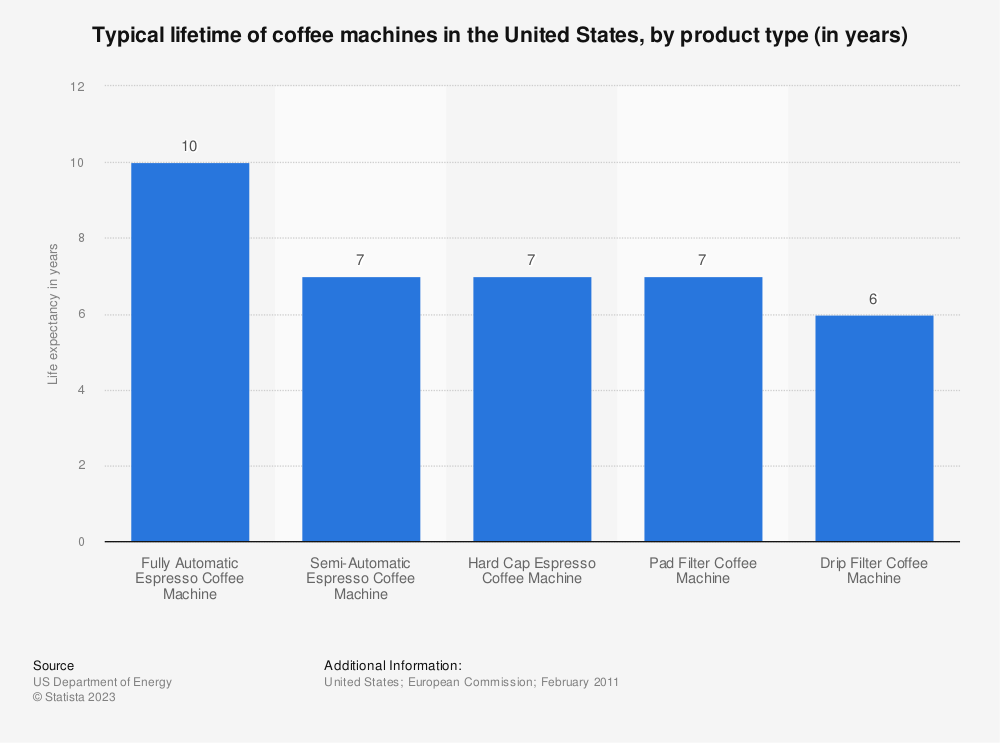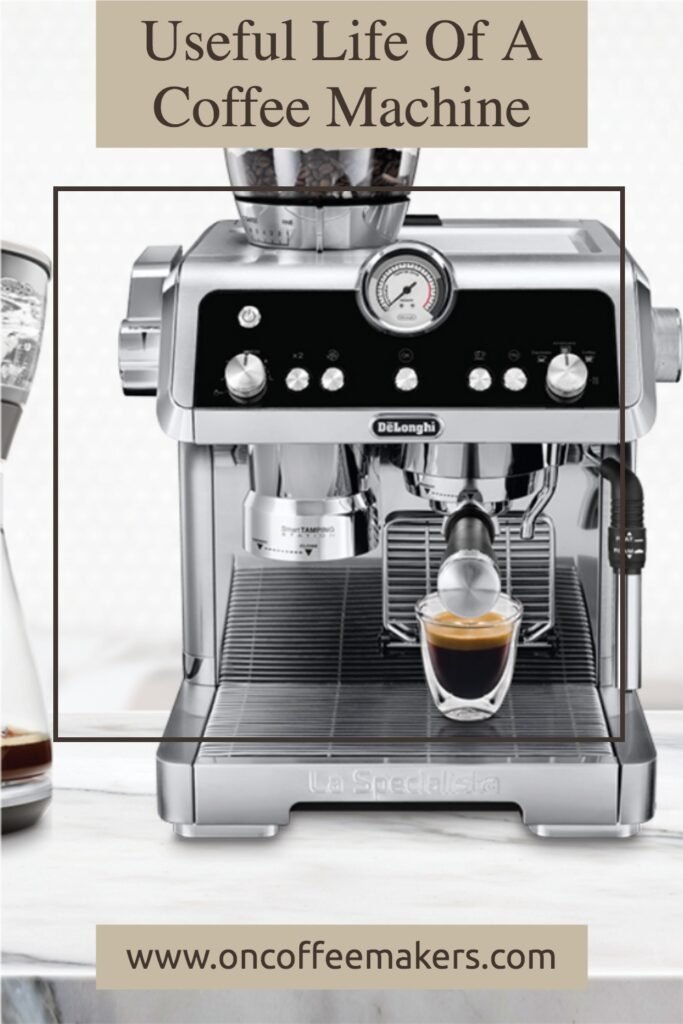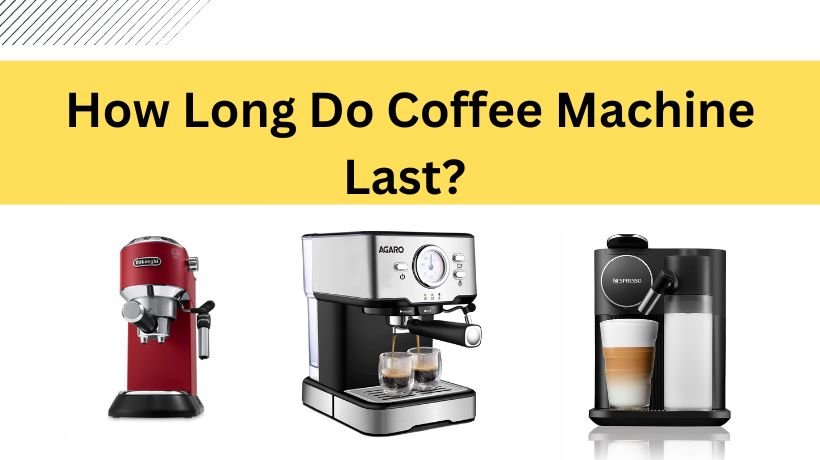Ah, the trusty coffee machine – your daily companion in the pursuit of a perfect cup of joe. But have you ever wondered how long this faithful appliance will stick by your side? Well, fear not, coffee enthusiast, for today we shall explore the fascinating world of coffee machine lifespans. From their humble beginnings to the futuristic wonders we see today, we will uncover the secrets behind the lifespan of these beloved caffeine companions. So grab a mug and join us as we unveil the truth about the average lifespan of a coffee machine.

Factors influencing the lifespan of a coffee machine
When it comes to the lifespan of a coffee machine, there are several factors that come into play. These factors can greatly impact how long your coffee machine will last and how well it performs during its lifetime. By understanding and considering these factors, you can make informed decisions when purchasing a coffee machine and take the necessary steps to extend its lifespan.
Quality of materials
One of the most important factors that determine the lifespan of a coffee machine is the quality of materials used in its construction. Coffee machines made with high-quality materials tend to be more durable and have a longer lifespan compared to those made with cheaper, lower-quality materials. It is worth investing in a coffee machine made with stainless steel, ceramic, and other robust materials to ensure its longevity.
Frequency of use
The frequency at which you use your coffee machine can also impact its lifespan. Coffee machines that are used multiple times a day may experience more wear and tear compared to those that are used less frequently. This is because the internal components of the coffee machine, such as the heating element and pump, are subject to more stress and strain with repeated use. However, with proper maintenance and regular cleaning, even a heavily used coffee machine can have a decent lifespan.
Maintenance and cleaning
Regular maintenance and cleaning are essential for the longevity of a coffee machine. Neglecting these tasks can lead to the buildup of limescale, clogged filters, and other issues that can significantly shorten the lifespan of the machine. It is important to follow the manufacturer’s guidelines for cleaning and maintenance, which may include descaling the machine, regularly changing filters, and wiping down the exterior. By keeping your coffee machine clean and well-maintained, you can ensure that it continues to function optimally for years to come.
Type of coffee machine
The type of coffee machine you choose can also affect its lifespan. Different types of coffee machines have varying internal mechanisms and components, which may impact their durability and longevity. It is important to research and consider the pros and cons of each type of coffee machine before making a purchase. For example, drip coffee machines are known for their simplicity and longevity, while espresso machines may have more complex internal components that require regular maintenance.
Brand reputation
The reputation of the brand you choose can also have an impact on the lifespan of your coffee machine. Reputable brands often prioritize quality and use durable materials in their coffee machines. They also tend to provide better customer support and warranty coverage, which can be beneficial if any issues arise with your machine. It is worth researching and considering the reputation and track record of different coffee machine brands before making a purchase.
Environmental factors
Environmental factors, such as temperature and humidity levels in your kitchen, can also play a role in the lifespan of your coffee machine. Extreme temperatures or high humidity can affect the internal components of the machine and potentially lead to issues or malfunctions. It is advisable to place your coffee machine in a well-ventilated area, away from direct sunlight and water sources, to ensure optimal performance and longevity.
Average lifespan of different types of coffee machines
Now that we have discussed the factors that influence the lifespan of a coffee machine, let’s take a closer look at the average lifespan of different types of coffee machines. Understanding the average lifespan of each type can help you make an informed decision when choosing the right coffee machine for your needs.
Drip coffee machines
Drip coffee machines are known for their simplicity and ease of use. They are designed to brew large quantities of coffee at a time, making them ideal for households with multiple coffee drinkers or offices. On average, a well-maintained drip coffee machine can last between 5 to 7 years. Proper cleaning and regular filter changes are essential in ensuring the longevity of a drip coffee machine.
Espresso machines
Espresso machines are more complex and have a higher number of moving parts compared to drip coffee machines. They are designed to produce high-pressure water flows through finely ground coffee, resulting in a concentrated and flavorful shot of espresso. The average lifespan of an espresso machine ranges from 7 to 10 years with proper maintenance and cleaning. Regular descaling, backflushing, and grouphead maintenance are crucial for keeping an espresso machine in good working condition.
Single-serve coffee machines
Single-serve coffee machines, also known as pod or capsule machines, have gained popularity for their convenience and ease of use. These machines use pre-packaged single-serving coffee pods or capsules to brew individual cups of coffee. The average lifespan of a single-serve coffee machine is around 3 to 5 years. While they may not have the same longevity as drip coffee machines or espresso machines, proper care and maintenance can help extend their lifespan.
French press coffee makers
French press coffee makers are a classic and affordable option for brewing coffee. They consist of a cylindrical glass or stainless steel container with a plunger and mesh filter. French press coffee makers have a relatively simple design and minimal moving parts, which contributes to their durability. With proper care and regular cleaning, a French press coffee maker can last between 5 to 8 years.
Extending the lifespan of your coffee machine
Now that you have a better understanding of the average lifespan of different types of coffee machines, you may be wondering how you can extend the lifespan of your own coffee machine. Fortunately, there are several maintenance practices that you can incorporate into your routine to ensure that your coffee machine lasts as long as possible.
Regular cleaning
Regular cleaning is essential for the longevity and performance of your coffee machine. Buildup of coffee oils, residue, and limescale can affect the taste of your coffee and interfere with the proper functioning of the machine. It is recommended to clean the removable parts of your coffee machine, such as the carafe, filter basket, and water reservoir, after each use. Additionally, deep cleaning tasks like descaling should be done periodically to remove limescale buildup.
Descaling
Descaling is the process of removing mineral deposits, mainly limescale, from the internal components of your coffee machine. Limescale can accumulate over time, especially if you use hard water in your coffee machine. Descaling should be done at regular intervals to prevent the buildup of limescale, which can affect the performance and lifespan of your coffee machine. Follow the manufacturer’s instructions for descaling, and use descaling solutions or homemade descaling remedies.
Proper storage
Proper storage of your coffee machine when not in use is crucial for preventing damage and extending its lifespan. Make sure to empty and clean the water reservoir, carafe, and filter basket before storing your machine. Keep it in a dry and dust-free area, and protect it from extreme temperatures. If you are storing your coffee machine for an extended period, consider removing the water filter and unplugging it to prevent any potential issues.
Use of filtered water
Using filtered water can significantly impact the lifespan of your coffee machine. Hard water, which contains high levels of minerals, can cause limescale buildup and clog the internal components of your machine. This can reduce the efficiency and lifespan of your coffee machine. To avoid this, consider using filtered water or a water softening system to reduce the mineral content in your water.
Regular maintenance
Besides cleaning and descaling, regular maintenance tasks can help prolong the lifespan of your coffee machine. Check the seals, gaskets, and other components for wear and tear, and replace them when necessary. The frequency of maintenance tasks may vary depending on the type and brand of your coffee machine, so refer to the user manual for specific instructions.
Common problems that affect the lifespan of coffee machines
Despite proper care and maintenance, coffee machines can still experience issues that can shorten their lifespan. Being aware of these common problems and addressing them promptly can help extend the longevity of your coffee machine.
Clogged filters
Clogged filters can affect the flow of water through your coffee machine, resulting in weak or poorly extracted coffee. This can be caused by the buildup of coffee grounds, oils, and mineral deposits. To prevent clogged filters, rinse them thoroughly after each use and replace them according to the manufacturer’s recommendations. Regular cleaning and descaling can also help prevent the buildup of residue that can clog the filters.
Limescale buildup
Limescale is a common issue in areas with hard water. It can accumulate on the heating element, pipes, and other internal components of your coffee machine over time. Limescale can affect the efficiency and performance of your machine, leading to potential malfunctions. Regular descaling can help remove limescale buildup and ensure the proper functioning of your coffee machine.
Malfunctioning heating element
The heating element is responsible for heating the water in your coffee machine to the optimal brewing temperature. Over time, the heating element may wear out or malfunction, resulting in issues such as lukewarm or overheated coffee. If you notice any inconsistencies in your coffee’s temperature, it could be a sign of a malfunctioning heating element. In such cases, contacting the manufacturer or a qualified technician for repairs is recommended.
Worn-out seals and gaskets
Seals and gaskets play a crucial role in preventing leaks and maintaining the proper pressure in your coffee machine. Over time, they can wear out or become damaged, resulting in water leaks or decreased performance. Regular inspection of seals and gaskets is important, and they should be replaced if any signs of wear or damage are detected. Proper cleaning and maintenance can help prolong the lifespan of seals and gaskets.
Leaking or dripping
Leaking or dripping is a common problem that can affect the lifespan of a coffee machine. It can be caused by various factors, including worn-out seals, loose connections, or damaged components. If you notice any leaks or drips, it is important to investigate and address the issue promptly to prevent further damage to your coffee machine. Depending on the severity of the leak, it may require professional repair or replacement of parts.

Benefits of a longer lifespan for a coffee machine
Now that we have discussed the factors that influence the lifespan of a coffee machine and ways to extend its lifespan, let’s explore the benefits of a longer lifespan for your coffee machine.
Cost savings
Investing in a coffee machine with a longer lifespan can lead to significant cost savings in the long run. Instead of having to purchase a new coffee machine every few years, a durable machine can last for a decade or more with proper care. This eliminates the need for frequent replacements and the associated costs.
Reduced waste
By extending the lifespan of your coffee machine, you contribute to reducing waste. Coffee machines are made from various materials, including plastic, metal, and electronics, which can have a negative impact on the environment if not properly disposed of. Keeping your coffee machine in good working condition for as long as possible helps minimize waste and environmental footprint.
Consistent and better-tasting coffee
A coffee machine that is well-maintained and functions optimally consistently produces better-tasting coffee. When internal components are clean and free from deposits, you can enjoy the full flavor and aroma of your favorite coffee beans. A longer lifespan allows you to savor your preferred coffee more consistently, ensuring a delightful coffee drinking experience.
Peace of mind
Knowing that your coffee machine is well-cared for and has a longer lifespan can provide peace of mind. You won’t have to worry about unexpected breakdowns or malfunctions, as regular maintenance and proper use reduce the likelihood of such issues. This peace of mind allows you to fully enjoy your coffee moments without the stress or inconvenience of a dysfunctional machine.
Signs that your coffee machine may need replacement
While proper care and maintenance can extend the lifespan of a coffee machine, there may come a time when replacement is necessary. Being aware of the signs that indicate your coffee machine may need replacing can help you make timely decisions and avoid any potential inconveniences.
Frequent breakdowns
If your coffee machine is experiencing frequent breakdowns despite your best efforts to maintain it, it may be a sign that it has reached the end of its lifespan. Repairing the machine repeatedly can become costly and time-consuming, and it may be more practical to invest in a new coffee machine.
Inconsistent coffee quality
A noticeable decline in the taste or quality of your coffee can indicate that your coffee machine is no longer functioning optimally. If your coffee is consistently weak, bitter, or lacks flavor even with proper brewing techniques and freshly roasted beans, it may be time to consider a replacement.
Unusual noises or smells
Unusual noises, such as grinding or grinding sounds, and strange smells emanating from your coffee machine can be indicators of underlying issues. These issues can range from worn-out components to motor or pump malfunctions. If the noises or smells persist despite regular cleaning and maintenance, it may be necessary to replace your coffee machine.
Water leakage
Persistent water leakage from your coffee machine is a clear sign of a problem that cannot be ignored. Leaks can range from minor drips to significant puddles and can damage surfaces or other equipment near the machine. If you are unable to locate or fix the source of the leak, it may be time to replace your coffee machine.
Inability to maintain desired temperature
A coffee machine that fails to reach or maintain the desired brewing or steaming temperature consistently may indicate a malfunctioning heating element or thermostat. This can result in underextracted or overextracted coffee, affecting the taste and quality of your brew. If you have exhausted all troubleshooting options and the issue persists, it may be a sign that your coffee machine needs replacing.

Average lifespan of popular coffee machine brands
While the lifespan of a coffee machine can vary depending on various factors, including maintenance and usage, it can be helpful to know the average lifespan of popular coffee machine brands. These averages can provide a general idea when considering a specific brand.
Brand A
Brand A is known for its high-quality and durable coffee machines. On average, their machines have a lifespan of 7 to 10 years. This brand is renowned for its attention to detail in design and use of robust materials, which contribute to the longevity of their products.
Brand B
Brand B offers a range of coffee machines with a focus on innovation and advanced features. Their machines have an average lifespan of 5 to 7 years. While not as long as Brand A, Brand B is known for providing excellent customer support and warranty coverage, which can help resolve any issues that may arise during the lifespan of their coffee machines.
Brand C
Brand C is a budget-friendly option, offering coffee machines at a more affordable price point. Their machines have an average lifespan of 3 to 5 years. While they may not have the same longevity as higher-end brands, Brand C emphasizes ease of use and simplicity, making them a popular choice for occasional coffee drinkers or those on a tight budget.
Factors to consider when purchasing a coffee machine
When purchasing a coffee machine, it is important to consider several factors beyond just the average lifespan. These factors can help ensure that you choose a machine that meets your needs and can be maintained effectively.
Warranty coverage
Checking the warranty coverage provided by the manufacturer is essential when purchasing a coffee machine. A longer warranty period can provide added peace of mind and protection against any potential issues or defects. It is also worth reviewing the terms and conditions of the warranty to understand what is covered and the requirements for making claims.
Availability of replacement parts
The availability of replacement parts is another important factor to consider, especially for coffee machines with more complex internal components. Before making a purchase, check whether the manufacturer offers easy access to replacement parts. This will make it easier to address any issues that may arise during the lifespan of your coffee machine and potentially extend its longevity.
Cost of maintenance
Coffee machines require regular maintenance tasks, such as descaling, filter replacement, and cleaning. It is worth considering the cost of these maintenance tasks when purchasing a coffee machine. Some machines may require specific cleaning solutions or filters that can be costly in the long run. Researching the ongoing maintenance costs and availability of affordable alternatives can help you make an informed decision.
Customer reviews and ratings
Reading customer reviews and ratings can provide valuable insights into the performance, reliability, and lifespan of a coffee machine. It is advisable to look for reviews from trusted sources or platforms to ensure the credibility of the information. Additionally, consider reaching out to friends, family, or coffee enthusiasts who own coffee machines to get their personal recommendations and experiences.

The role of user maintenance in determining lifespan
While the factors discussed earlier, such as quality of materials and brand reputation, play a significant role in determining the lifespan of a coffee machine, the user’s maintenance practices are equally important. Proper care and regular maintenance are essential for the optimal performance and longevity of your coffee machine.
User manual guidelines
The user manual provided by the manufacturer is a valuable resource that outlines important guidelines and recommendations for proper use and maintenance. It is important to read and understand the user manual thoroughly before using your coffee machine. Following the manufacturer’s guidelines for cleaning, descaling, and maintenance will help you avoid potential issues and ensure the longevity of your coffee machine.
Proper descaling and cleaning practices
Descaling and cleaning tasks are crucial for preventing limescale buildup, clogged filters, and other issues that can affect the lifespan of your coffee machine. It is important to follow the recommended frequency and procedure for descaling and cleaning, as specified in the user manual. Using the appropriate descaling solution or homemade remedies, as recommended by the manufacturer, will help keep your coffee machine in optimal condition.
Timely repairs and servicing
Promptly addressing any issues or malfunctions that arise with your coffee machine is crucial for its longevity. If you notice any unusual behavior, such as inconsistent coffee quality, excessive noise, or water leakage, consult the user manual for troubleshooting steps. If the issue persists or if you are unsure how to proceed, contacting the manufacturer’s customer support or a qualified technician for repairs is advisable. Timely repairs and servicing can help prevent further damage and potentially extend the lifespan of your coffee machine.
Conclusion
The lifespan of a coffee machine can be influenced by various factors, including the quality of materials, frequency of use, maintenance and cleaning practices, type of coffee machine, brand reputation, and environmental factors. Understanding these factors and taking the necessary steps to extend the lifespan of your coffee machine, such as regular cleaning, descaling, and proper maintenance, can help maximize its longevity.
While each type of coffee machine has its own average lifespan, proper care and maintenance can significantly extend their longevity. Recognizing common problems that can affect the lifespan of coffee machines, such as clogged filters, limescale buildup, malfunctioning heating elements, worn-out seals, and leaking or dripping, is important for timely troubleshooting and potential replacement.
The benefits of a longer lifespan for a coffee machine include cost savings, reduced waste, consistent and better-tasting coffee, and peace of mind. Considering factors such as warranty coverage, availability of replacement parts, cost of maintenance, customer reviews, and user maintenance practices are crucial when purchasing a coffee machine and ensuring its optimal performance and longevity.
By following the user manual guidelines, implementing proper descaling and cleaning practices, and addressing any issues or malfunctions promptly, you can play an active role in determining the lifespan of your coffee machine. With proper care and maintenance, your coffee machine can continue to serve you delicious coffee for many years to come.

